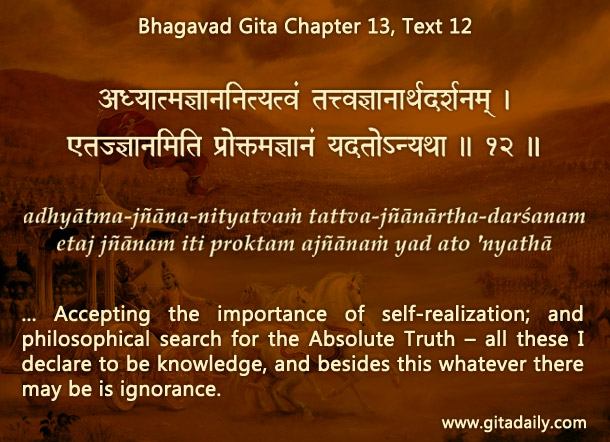When we acquire knowledge, the ego frequently gets intoxicated, “I know so much.” If others respect us for our learning, then getting more respect often becomes the driving purpose of our study.
Acquiring knowledge with this purpose is like climbing atop a mountain so that the world will see us as a champion. But people may not notice our learning at all or may notice it only briefly. Or someone else may displace us at the top by becoming more learned or just appearing more learned. Thus, the ego-driven pursuit of knowledge leaves us disappointed. More detrimentally, it makes us miss the opportunity to view the world with learned eyes, just as a person on a mountaintop obsessed with “Who all are looking at me?” misses the special view available from that peak.
What is the special view that knowledge offers? Deep learning in any field makes us realize the hugeness of the world, indeed the hugeness of even its one tiny slice that is our specialty. Pertinently, the Bhagavad-gita (13.08) indicates that knowledge begins with humility. It (13.09) further states that knowledge involves recognizing the inevitability of old age, disease and death, thus underscoring the temporality of material existence and the inadequacy of material knowledge. Seeking the eternal beyond the material, we probe the true nature of things (Gita 13.12). Our search culminates in the supreme spiritual reality, Krishna, as the substance of everything (Gita 07.19: vaasudevah sarvam iti). We realize him to be the embodiment and fulfillment of our heart’s deepest aspirations – an inexhaustible ocean of beauty, love and joy.
Thus, by studying to truly learn, not to show off our learning, we attain the highest destination, thereby fulfilling the purpose of study and of life itself.

Explanation of article:
Podcast:

Hare Krishna,
AGTSP.
Very very beneficial article ,Probhuji,thanks you.
What a title !! Haribol. I am posting this comment without reading rest of the stuff. 🙂